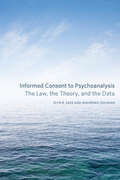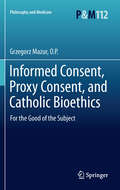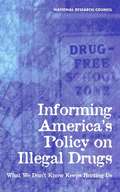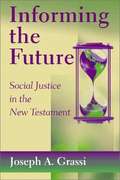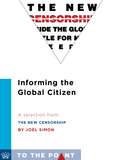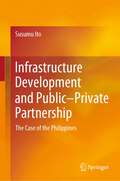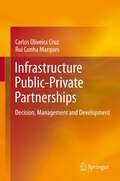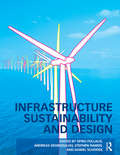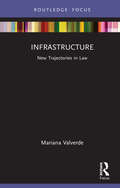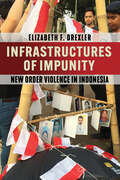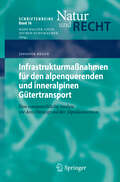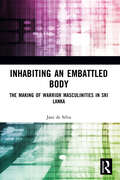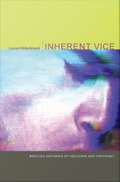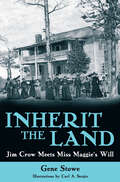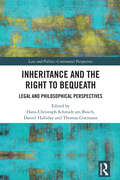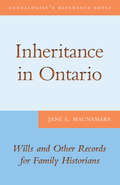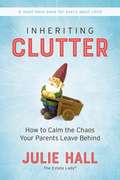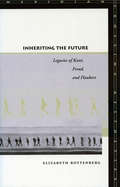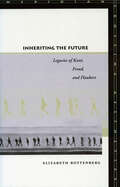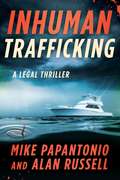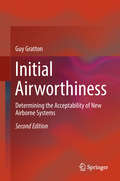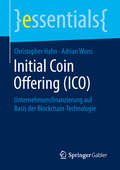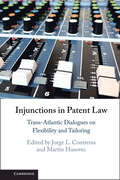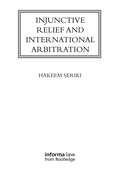- Table View
- List View
Informed Consent to Psychoanalysis: The Law, the Theory, and the Data (Psychoanalytic Interventions)
by Elyn R. Saks Shahrokh GolshanThe goal of this book is to shed psychoanalytic light on a concept—informed consent—that has transformed the delivery of health care in the United States.Examining the concept of informed consent in the context of psychoanalysis, the book first summarizes the law and literature on this topic. Is informed consent required as a matter of positive law? Apart from statutes and cases, what do the professional organizations say about this?Second, the book looks at informed consent as a theoretical matter. It addresses such questions as: What would be the elements of a robust informed consent in psychoanalysis? Is informed consent even possible here? Can patients really understand, say, transference or regression before they experience them, and is it too late once they have? Is informed consent therapeutic or countertherapeutic? Can a “process view” of informed consent make sense here?Third, the book reviews data on the topic. A lengthy questionnaire answered by sixty-two analysts reveals their practices in this regard. Do they obtain a statement of informed consent from their patients? What do they disclose? Why do they disclose it? Do they think it is possible to obtain informed consent in psychoanalysis at all? Do they think the practice is therapeutic or countertherapeutic, and in what ways? Do they think there should or should not be an informed consent requirement for psychoanalysis?The book should appeal above all to therapists interested in the ethical dimensions of their practice.
Informed Consent, Proxy Consent, and Catholic Bioethics
by Grzegorz Mazur, O.P.This work offers a comprehensive understanding rooted in Catholic anthropology and moral theory of the meaning and limits of informed and proxy consent to experimentation on human subjects. In particular, it seeks to articulate the rationale for proxy consent in both therapeutic and nontherapeutic settings. As to the former, the book proposes that the Golden Rule, recognizing the basic inclinations of human nature toward objective goods perfective of human persons, should underpin the notion of proxy consent to experimentation on humans. As to the latter, an additional scrutiny of the amount of risk involved is necessary, since the risk-benefit ratio frequently invoked to justify higher-risk therapeutic research does not exist in its nontherapeutic counterpart. This study discusses a number of possible solutions to this question and develops a position that builds upon the objective notion of the human good.
Informing America's Policy on Illegal Drugs: What We Don't Know Keeps Hurting Us
by National Research CouncilHow should the war on drugs be fought? Everyone seems to agree that the United States ought to use a combination of several different approaches to combat the destructive effects of illegal drug use. Yet there is a remarkable paucity of data and research information that policy makers require if they are to create a useful, realistic policy package-details about drug use, drug market economics, and perhaps most importantly the impact of drug enforcement activities.Informing America's Policy on Illegal Drugs recommends ways to close these gaps in our understanding-by obtaining the necessary data on drug prices and consumption (quantity in addition to frequency); upgrading federal management of drug statistics; and improving our evaluation of prevention, interdiction, enforcement, and treatment efforts.The committee reviews what we do and do not know about illegal drugs and how data are assembled and used by federal agencies. The book explores the data and research information needed to support strong drug policy analysis, describes the best methods to use, explains how to avoid misleading conclusions, and outlines strategies for increasing access to data. Informing America's Policy on Illegal Drugs also discusses how researchers can incorporate randomization into studies of drug treatment and how state and local agencies can compare alternative approaches to drug enforcement.Charting a course toward a better-informed illegal drugs policy, this book will be important to federal and state policy makers, regulators, researchers, program administrators, enforcement officials, journalists, and advocates concerned about illegal drug use.
Informing The Future: Social Justice In The New Testament
by Joseph GrassiThe roots of social justice run deep -- right back to the Bible. Now, in Informing the Future, scripture scholar, writer and teacher Joseph A. Grassi takes readers back to the New Testament to explore the place of social justice -- the just distribution of economic, social and cultural resources to all people -- as envisioned and practiced in its pages. It is there, the author demonstrates, that we will find the inspiration that challenges us, sustains us and brings hope to our world today.
Informing the Global Citizen: A Selection from The New Censorship: Inside the Global Battle for Media Freedom (To the Point)
by Joel SimonToday, anyone with an iPhone can provide firsthand accounts from the world's front lines. Despite our increased access to events around the world, journalists are more vital than ever as they bring context and perspective and help to set the humanitarian agenda. However, threats to journalists are mounting with record numbers killed and imprisoned each year. From the drug wars of Mexico to Iraq and Tahrir Square, Joel Simon explores the new challenges and dangers to the future of journalistic freedom.
Informing the Global Citizen: Inside the Global Battle for Media Freedom
by Joel SimonToday, anyone with an iPhone can provide firsthand accounts from the world's front lines. Despite our increased access to events around the world, journalists are more vital than ever as they bring context and perspective and help to set the humanitarian agenda. However, threats to journalists are mounting with record numbers killed and imprisoned each year. From the drug wars of Mexico to Iraq and Tahrir Square, Joel Simon explores the new challenges and dangers to the future of journalistic freedom.
Infrastructure Development and Public–Private Partnership: The Case of the Philippines
by Susumu ItoThis is the first book that analyzes public–private partnership (PPP) infrastructure development in developing countries by focusing on recent developments in the Philippines.Infrastructure is extremely important for economic development and poverty reduction. However, given the infrastructure gap and pressures on public expenditure, there is a growing expectation that PPP will fill this gap globally. Over the years, PPP as a mechanism for financing and procuring infrastructure has been the basis of an active and provocative debate in the Philippines, which is known to have inadequate infrastructure—twice in the 2010s, when a significant policy shift on the financing source of public infrastructure was announced by the Philippine government. Drastic policy changes concerning the roles of public finance and PPP in infrastructure development within this decade are not seen in other developing countries.There is no precedent for substantial study on the changes of infrastructure governance in the Philippines, but this book assesses policy changes in infrastructure development in the country and, as academic contributions, identifies several factors behind the changes related to infrastructure governance there, especially the drastic shifts during the Aquino III and Duterte administrations. Furthermore, the findings presented in the book, including the desirable role of public finance and PPP in developing infrastructure in developing countries, could improve infrastructure governance, such as choice of the financing mode, design, and implementation of the PPP project, in other developing countries as an operable contribution to policymakers of government and to industry and management practitioners.
Infrastructure Public-Private Partnerships: Decision, Management and Development
by Carlos Oliveira Cruz Rui Cunha MarquesEconomic development and social welfare depend on the existence of effective and efficient infrastructure systems, particularly in health, energy, transportation and water, many of which are developed and managed through Public-Private Partnerships (PPPs). However, empirical evidence suggests some pitfalls in the use of these PPP arrangements. This book addresses these issues, focusing on mostly three key questions: How to improve the robustness of the decision-making process leading to the option of PPP? How to improve contract management as the longest phase of the process? How can contracts be improved to accommodate uncertainty and avoid harmful renegotiations? The authors explore the concept of flexible contracts, the uncertainty modeling for improving the robustness of the decision-making process, and develop an overall framework for effective contract management, along with a comprehensive analysis of current renegotiation patterns. The ultimate goal is to improve the contractual performance, as well as the overall infrastructure management and social welfare.
Infrastructure Sustainability and Design
by Andreas Georgoulias Daniel Schodek Spiro Pollalis Stephen RamosYou're overseeing a large-scale project, but you're not an engineering or construction specialist, and so you need an overview of the related sustainability concerns and processes. To introduce you to the main issues, experts from the fields of engineering, planning, public health, environmental design, architecture, and landscape architecture review current sustainable large-scale projects, the roles team members hold, and design approaches, including alternative development and financing structures. They also discuss the challenges and opportunities of sustainability within infrastructural systems, such as those for energy, water, and waste, so that you know what's possible. And best of all, they present here for the first time the Zofnass Environmental Evaluation Methodology guidelines, which will help you and your team improve infrastructure design, engineering, and construction.
Infrastructure: New Trajectories in Law (New Trajectories in Law)
by Mariana ValverdeThis book provides an overview and assessment of infrastructure’s legal and governance underpinnings. Infrastructure is often thought of as a term referring only to the physical entities – pipes, cables, utility poles, highways, airports – that facilitate the transmission of water, gas, telecommunications and electricity, as well as enabling both private and public transportation, and serving to house more or less public services such as health care and schools. However, infrastructure planning and implementation are not reducible to bricks and mortar. The complex process requires drawing from and sometimes re-inventing or recycling legal tools, from construction contracts to financing ‘deals’, which are often taken for granted by both practitioners and urban studies scholars. These are as important today as they were when the first railway lines were built, and to a large extent they remain just as invisible: the avalanche of drawings and photographs of planned or in-process fancy buildings tends to hide from view the behind- the-scenes negotiations and decision-making that had to happen before construction could start, and which in some cases continue afterwards. This book does not ignore the material and nonhuman aspects of infrastructure. But, focusing on the legal and governance underpinnings of infrastructure projects, via a series of key terms that refer to hybrid legal processes, the book offers an important socio-legal supplement to the current ‘infrastructure turn’. This book will be of interest to students in the areas of socio-legal studies, urban sociology, urban studies, urban geography, planning, public law, and contract law, as well as practitioners involved in infrastructure projects.
Infrastructures of Impunity: New Order Violence in Indonesia (Cornell Modern Indonesia Project)
by Elizabeth F. DrexlerIn Infrastructures of Impunity Elizabeth F. Drexler argues that the creation and persistence of impunity for the perpetrators of the Cold War Indonesian genocide (1965–66) is not only a legal status but also a cultural and social process. Impunity for the initial killings and for subsequent acts of political violence has many elements: bureaucratic, military, legal, political, educational, and affective. Although these elements do not always work at once—at times some are dormant while others are ascendant—together they can be described as a unified entity, a dynamic infrastructure, whose existence explains the persistence of impunity. For instance, truth telling, a first step in many responses to state violence, did not undermine the infrastructure but instead bent to it. Creative and artistic responses to revelations about the past, however, have begun to undermine the infrastructure by countering its temporality, affect, and social stigmatization and demonstrating its contingency and specific actions, policies, and processes that would begin to dismantle it. Drexler contends that an infrastructure of impunity could take hold in an established democracy.
Infrastrukturmaßnahmen für den alpenquerenden und inneralpinen Gütertransport: Eine europarechtliche Analyse vor dem Hintergrund der Alpenkonvention
by Jennifer HeuckDas steigende Güterverkehrsaufkommen in der Europäischen Union führt zu Umweltbeeinträchtigungen, von denen der Alpenraum in besonderem Maße betroffen ist. Das vorliegende Werk geht der Frage nach, wie dem unter Berücksichtigung der Grundfreiheiten der Europäischen Union - insbesondere des freien Warenverkehrs - durch gezielte rechtliche Maßnahmen begegnet werden kann. Zentrale Bedeutung kommt dabei den rechtlichen Bestimmungen zur Errichtung und Nutzung von Infrastrukturen für den alpenquerenden und inneralpinen Güterverkehr zu, insbesondere der Alpenkonvention - einem völkerrechtlichen Abkommen zum Schutz und Erhalt der Alpen - und ihrem Verkehrsprotokoll, deren Vertrags- bzw. Unterzeichnerparteien die Europäische Union sowie die acht Alpenstaaten sind. Die Alpenkonvention und das Verkehrsprotokoll werden in dem Werk erstmals umfassend dargestellt und analysiert. Schließlich zeigt die Untersuchung, welche rechtlichen Wirkungen das Verkehrsprotokoll, das die Europäische Union bisher lediglich unterzeichnet hat, im Falle seiner Ratifikation für die Europäische Union entfalten würde.
Inhabiting an Embattled Body: The Making of Warrior Masculinities in Sri Lanka
by Jani de SilvaThis book offers an anthropological account of Sri Lanka’s Eelam Wars III and IV. It is based on the life-narratives of ex-servicemen who fought on the frontlines. The volume approaches militarism as a practice of masculinity. It explores the sense of embattlement that young recruits feel, which stems from the inner war between notions of bodily deference instilled in childhood and having to conduct offensives on the battlefield. Thus though they wish to move smoothly into the assault techniques learnt in combat-training, they sometimes find their bodies are acting-out a different trajectory; engaging in acts of spectacular violence or simply running away. It traverses themes such as masculinity and Sinhala society, British martial masculinity vs the composed body in Sinhala discourse, combat-training and the battlefield. The author traces the ways in which troops tried to negotiate the thin line between valour and violence in a context in which the enemy’s suicide fighters engaged in the more extreme code of sacrificing-the-body, which derided the very manliness of soldiers who couldn’t prevail against them. She argues that the Sri Lankan experience has resonance for soldiers on battlefields everywhere, who become embattled when confronted by adversaries whose practice seems to diminish their own manliness. Rich in ethnographical narratives, this book will be interest scholars and researchers of war studies, gender studies, masculinity studies, peace and conflict studies, ethnic studies, political science, international relations, sociology, social anthropology, cultural studies, and South Asian studies, especially those concerned with Sri Lanka.
Inherent Vice: Bootleg Histories of Videotape and Copyright
by Lucas HilderbrandIn an age of digital technology and renewed anxiety about media piracy, Inherent Vice revisits the recent analog past with an eye-opening exploration of the aesthetic and legal innovations of home video. Analog videotape was introduced to consumers as a blank format, essentially as a bootleg technology, for recording television without permission. The studios initially resisted VCRs and began legal action to oppose their marketing. In turn, U. S. courts controversially reinterpreted copyright law to protect users' right to record, while content owners eventually developed ways to exploit the video market. Lucas Hilderbrand shows how videotape and fair use offer essential lessons relevant to contemporary progressive media policy. Videotape not only radically changed how audiences accessed the content they wanted and loved but also altered how they watched it. Hilderbrand develops an aesthetic theory of analog video, an "aesthetics of access" most boldly embodied by bootleg videos. He contends that the medium specificity of videotape becomes most apparent through repeated duplication, wear, and technical failure; video's visible and audible degeneration signals its uses for legal transgressions and illicit pleasures. Bringing formal and cultural analysis into dialogue with industrial history and case law, Hilderbrand examines four decades of often overlooked histories of video recording, including the first network news archive, the underground circulation of Superstar: The Karen Carpenter Story, a feminist tape-sharing network, and the phenomenally popular website YouTube. This book reveals the creative uses of videotape that have made essential content more accessible and expanded our understanding of copyright law. It is a politically provocative, unabashedly nostalgic ode to analog.
Inherit the Land: Jim Crow Meets Miss Maggie's Will
by Gene StoweIn the early twentieth century, two wealthy white sisters, cousins to a North Carolina governor, wrote identical wills that left their substantial homeplace to a black man and his daughter. Maggie Ross, whose sister Sallie died in 1909, was the richest woman in Union County, North Carolina. Upon Maggie's death in 1920, her will bequeathed her estate to Bob Ross—who had grown up in the sisters' household—and his daughter Mittie Bell Houston. Mittie had also grown up with the well-to-do women, who had shown their affection for her by building a house for her and her husband. This house, along with eight hundred acres, hundreds of dollars in cash, and two of the white family's three gold watches went to Bob Ross and Houston. As soon as the contents of the will became known, more than one hundred of Maggie Ross's scandalized cousins sued to break the will, claiming that its bequest to black people proved that Maggie Ross was mentally incompetent. Revealing the details of this case and of the lives of the people involved in it, Gene Stowe presents a story that sheds light on and complicates our understanding of the Jim Crow South. Stowe's account of this famous court battle shows how specific individuals, both white and black, labored against the status quo of white superiority and ultimately won. An evocative portrait of an entire generation's sins, Inherit the Land: Jim Crow Meets Miss Maggie's Will hints at the possibility for color-blind justice in small-town North Carolina.
Inheritance and the Right to Bequeath: Legal and Philosophical Perspectives (Law and Politics)
by Thomas Gutmann Daniel Halliday Hans-Christoph Schmidt am BuschIn every Western democracy today, inheritances have a very profound influence on people’s lives. This motivates renewed scholarship on inheritance law by philosophy and the legal sciences. The present volume aims to contribute to some ongoing areas of inquiry while also filling some gaps in research. It is organized in a highly interdisciplinary way. In the thirteen chapters of the book, written by outstanding philosophers and legal scholars, the following questions, among others, are discussed: What is the nature of the right to bequeath? What are the social functions of bequest and inheritance? What arguments concerning justice have philosophers and legal scholars advanced in favour or against practices of bequest and inheritance? How should we think about taxing the wealth transfers that occur in bequest and inheritance? In discussing these questions, the authors break new ground and offer much needed insight into several related domains, such as the philosophy of law; legal theory; general and applied ethics; social and political philosophy; theories of justice; and the history of legal, political, and economic thought. This book will be of great interest to scholars in these areas as well as policy-makers.
Inheritance in Ontario: Wills and Other Records for Family Historians
by Jane E. MacnamaraA guide to researching your family’s inheritance history in Ontario. Whether your ancestor left hundreds of acres of land, money, or a few modest belongings, the records created when those legacies were distributed can provide valuable clues to family connections, relationships, and just how your ancestors lived.Inheritance in Ontario will help you determine whether your relative’s will was proved in the Court of Probate, surrogate courts, or another court, and navigate the finding aids to locate surviving estate files and other complementary records at the Archives of Ontario, local courthouse or archives, or through FamilySearch.org. Not every Ontario estate was handled by a court, however, and land records, newspapers, and manuscript collections can also help you discover "who got what."
Inheriting Clutter: How to Calm the Chaos Your Parents Leave Behind
by Julie HallEveryday hundreds of adult children become middle-aged orphans when their elderly parents pass away, leaving behind more than just memories.You&’ve heard the horror stories: arguments over stuff, an inheritance lost forever when easily deceived parents are scammed, siblings estranged, an adult heir taken from daily responsibilities for months because of the enormous task of clearing out a childhood home. It doesn&’t have to be that way.The Estate Lady, professional estate liquidator Julie Hall, knows what to do. Whether your parents are still living or you&’re caught in the middle of a crisis, Inheriting Clutter: How to Calm the Chaos Your Parents Leave Behind has solutions. Hall provides trustworthy counsel on how to:Divide your parents&’ estate with peace of mindMinimize fighting with siblings during the estate settlement processClear out the family home in thirty days or lessIdentify potential items of value in the homeHave &“that conversation&” with your parentsPrepare your own children for the futureThe Estate Lady offers guidance for any executor, heir, or beneficiary, sharing some of her most fascinating stories as well as helpful checklists of the things that need to be done now and at the time of your loss.Inheriting Clutter gives you practical, effective steps for liquidating and distributing your parents&’ assets in a way that both honors them and promotes family harmony for generations to come.
Inheriting the Future
by Elizabeth RottenbergThis book explores several canonical works of philosophy, psychoanalysis, and literature. The surprising juxtaposition of Kant's moral philosophy, Freud's reflections on obsessional neurosis, and Flaubert's peculiar late novel Bouvard et Pécuchet forms the basis of a compelling argument linking each of these central works around the problem of moral thought as it fundamentally determines the modern subject in relation to time. The book engages an area of emerging importance in contemporary critical thought, the problem of ethics or "otherness" as a crucial factor at play in speculative and literary works. The readings in this book provide insight into the ways in which three fundamental philosophical, psychoanalytic, and literary texts can be reread in light of their confrontation with a seemingly inhuman force at the heart of the foundation of the human subject.
Inheriting the Future: Legacies of Kant, Freud, and Flaubert
by Elizabeth RottenbergThis book explores several canonical works of philosophy, psychoanalysis, and literature. The surprising juxtaposition of Kant's moral philosophy, Freud's reflections on obsessional neurosis, and Flaubert's peculiar late novel Bouvard et Pécuchet forms the basis of a compelling argument linking each of these central works around the problem of moral thought as it fundamentally determines the modern subject in relation to time. The book engages an area of emerging importance in contemporary critical thought, the problem of ethics or "otherness" as a crucial factor at play in speculative and literary works. The readings in this book provide insight into the ways in which three fundamental philosophical, psychoanalytic, and literary texts can be reread in light of their confrontation with a seemingly inhuman force at the heart of the foundation of the human subject.
Inhuman Trafficking: A Legal Thriller
by Alan Russell Mike PapantonioA fast-paced thriller in the tradition of John Grisham, Joseph Finder, and John Lescroart For Nick &“Deke&” Deketomis, going where angels fear to tread in waging legal battles has long been a way of life. As managing partner for one of the nation&’s largest plaintiffs&’ law firms, Deke has gone toe to toe with some of the largest corporations in the world. His firm specializes in the tough, even quixotic, cases that few lawyers would dare to take on. Like human trafficking. Deke&’s target this time is Welcome Mat Hospitality, a firm known for its truck stops and lodging throughout the United States. What Welcome Mat doesn&’t advertise is the human trafficking—for sex work and slave labor—going on at many of its properties. For the sake of better profits, Welcome Mat&’s ownership has turned a blind eye to this lucrative enterprise. As invested as Deke is in the case, though, it takes on even greater urgency when the past comes calling with word that his fifteen-year-old goddaughter, Lily Reyes, is missing. When Deke learns that Lily has fallen prey to a notorious trafficker, his personal and professional worlds converge. For his goddaughter to survive, Deke must prevail not only in the legal arena but outside of it.
Initial Airworthiness: Determining The Acceptability Of New Airborne Systems
by Guy GrattonDesigned as an introduction for both advanced students in aerospace engineering and existing aerospace engineers, this book covers both engineering theory and professional practice in establishing the airworthiness of new and modified aircraft. Initial Airworthiness includes information on:· how structural, handling, and systems evaluations are carried out;· the processes by which safety and fitness for purpose are determined; and· the use of both US and European unit systemsCovering both civil and military practice and the current regulations and standards across Europe and North America, Initial Airworthiness will give the reader an understanding of how all the major aspects of an aircraft are certified, as well as providing a valuable source of reference for existing practitioners.This second edition has been updated for changes in regulation worldwide, including UK "E-conditions" and Single Seat De-Regulation, the new part 23 regulations in the USA and Europe, and developments to Extended Range Twin-Engine Operations worldwide. Entirely new sections have been added to explain the management of certification programmes, professional ethics within airworthiness practice, environmental impact of aircraft, and aeroplane departures from controlled flight. This edition also includes many new figures, case studies and references to sources of further information.
Initial Coin Offering: Unternehmensfinanzierung Auf Basis Der Blockchain-technologie (Essentials)
by Christopher Hahn Adrian WonsDas essential vermittelt einen Einblick in den Ablauf und die Funktionsweise eines Initial Coin Offering (ICO) als innovative Finanzierungsmethode für Start-up-Unternehmen. Ein ICO erzielt unabhängig von klassischen Kapitalgebern schnell eine große Reichweite möglicher Investoren und erfolgt dabei rein digital auf Basis der Blockchain-Technologie. Die Autoren erläutern die Bedeutung und die Struktur eines ICO sowie die Notwendigkeit für junge Unternehmen, sich frühzeitig mit den rechtlichen Anforderungen und der Planung auseinanderzusetzen. Das essential enthält zahlreiche Übersichten zum illustrativen Verständnis sowie praxisnahe Checklisten zur Planung und Durchführung eines ICOs.
Injunctions in Patent Law: Trans-Atlantic Dialogues on Flexibility and Tailoring
by Martin Husovec Jorge L. ContrerasPatents are important tools for innovation policy. They incentivize the creation and dissemination of new technical solutions and help to disclose their working to the public in exchange for limited exclusivity. Injunctions are important tools of their enforcement. Much has been written about different aspects of the patent system, but the issue of injunctions is largely neglected in the comparative legal literature. This book explains how the drafting, tailoring and enforcement of injunctions in patent law works in several leading jurisdictions: Europe, the United States, Canada, and Israel. The chapters provide in-depth explanation of how and why national judges provide for or reject flexibility and tailoring of injunctive relief. With its transatlantic and intra- European comparisons, as well as a policy and theoretical synthesis, this is the most comprehensive overview available for practicing attorneys and scholars in patent law. This book is also available as Open Access on Cambridge Core.
Injunctive Relief and International Arbitration: Injunctive Relief And International Arbitration (Lloyd's Arbitration Law Library)
by Hakeem SerikiThis book explores from an English law and Institutional perspective the various types of injunctive relief that are available to a party before and during arbitral proceedings. In particular, this book examines the basis of the power of English Courts to grant such injunctions and explains when such injunctions will be granted. It considers any limitations attached to such injunctions and the relationship between section 44 of the Arbitration Act 1996 and section 37 of the Senior Courts Act 1981. It also provides an in-depth analysis of case law and the emerging trends in this area of arbitration, as well as the powers of arbitrators under the ICC and LCIA Rules to grant such relief and other remedies that might be available to a party seeking to uphold an arbitration agreement. This book will be a vital reference tool for practitioners, arbitrators and postgraduate students.
